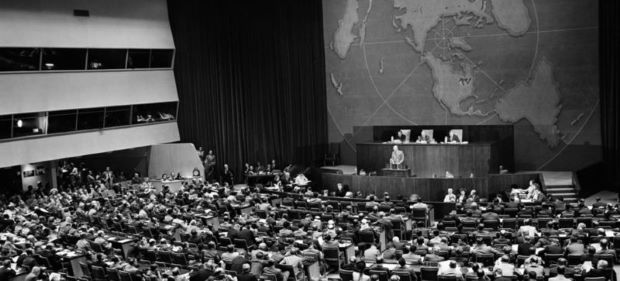The United Nations Partition Plan for Palestine, a proposal by the United Nations recommending a partition of Mandatory Palestine at the end of the British Mandate was adopted by the UN General Assembly as Resolution 181 (ll) on this day in 1947.
The resolution recommended the creation of independent Arab and Jewish States and a Special International Regime for the city of Jerusalem. The Partition Plan, a four-part document attached to the resolution, provided for the termination of the Mandate, the progressive withdrawal of British armed forces and the delineation of boundaries between the two States and Jerusalem. Part I of the Plan stipulated that the Mandate would be terminated as soon as possible and the United Kingdom would withdraw no later than August 1, 1948. The new states would come into existence two months after the withdrawal, but no later than October 1, 1948.
The Plan sought to address the conflicting objectives and claims of two competing movements, Palestinian nationalism and Jewish nationalism, or Zionism. The Plan also called for Economic Union between the proposed states, and for the protection of religious and minority rights.
While Jewish organizations collaborated with UNSCOP during the deliberations, the Palestinian Arab leadership boycotted it. The proposed plan was considered to have been pro-Zionist by its detractors, with 56% of the land allocated to the Jewish state despite the Palestinian Arab population numbering twice the Jewish population.[ The plan was celebrated by most Jews in Palestine and reluctantly accepted by the Jewish Agency for Palestine with misgivings. Historians say that acceptance of the plan was a tactical step and that some Zionist leaders viewed the plan as a stepping stone to future territorial expansion over the whole of Palestine.
The Arab Higher Committee, the Arab League and other Arab leaders and governments rejected it on the basis that in addition to the Arabs forming a two-thirds majority, they owned a majority of the lands. They also indicated an unwillingness to accept any form of territorial division, arguing that it violated the principles of national self-determination in the UN Charter which granted people the right to decide their own destiny. They announced their intention to take all necessary measures to prevent the implementation of the resolution. Subsequently, a civil war broke out in Palestine, and the plan was not implemented.
-Wikipedia
Photo Caption –The vote on the United Nations Partition Plan for Palestine or United Nations General Assembly Resolution 181 on November 29, 1947 in Flushing, New York, USA – Public Domain



Comments are closed, but trackbacks and pingbacks are open.